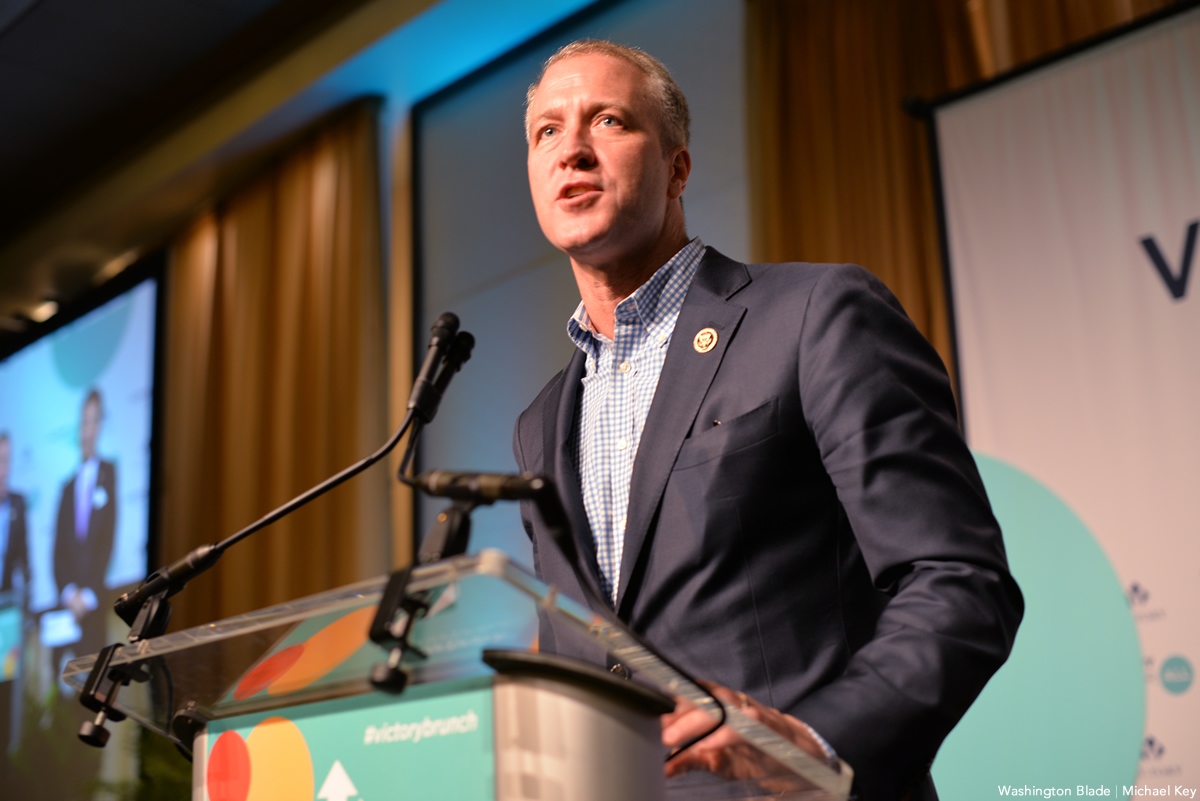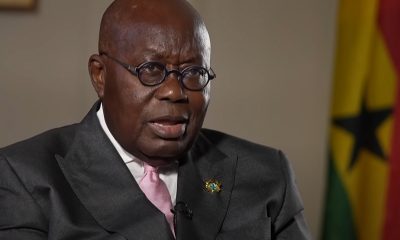State Department
State Department criticizes passage of anti-LGBTQ bill in Ghanaian Parliament
‘Limiting the rights of one group in a society undermines the rights of all’

The State Department on Wednesday criticized the passage of a bill in Ghana that would further criminalize LGBTQ people and make advocacy on their behalf illegal.
State Department spokesperson Matthew Miller in a statement said the U.S. “is deeply troubled by the Ghanaian Parliament’s passage of legislation, officially called the Human Sexual Rights and Family Values Bill, which would threaten all Ghanaians’ constitutionally protected freedoms of speech, press and assembly.”
“The bill seeks to criminalize any person who simply identifies as LGBTQI+, as well as any friend, family, or member of the community who does not report them,” said Miller. “Limiting the rights of one group in a society undermines the rights of all. The United States echoes the call by those Ghanaians who have urged a review of the constitutionality of the bill to protect the rights of all individuals in Ghana.”
Miller noted the bill “would also undermine Ghana’s valuable public health, media and civic spaces and economy” and stressed “international business coalitions have already stated that such discrimination in Ghana would harm business and economic growth in the country.”
“Ghana’s tradition of tolerance, peace and respect for human rights is a source of stability and prosperity that has long served as a model for countries around the globe,” he added. “This legislation is inconsistent with these values and will, if it becomes law, undermine this laudable tradition.”
Ghanaian MPs approved the bill on Wednesday, and it awaits President Nana Akufo-Addo’s signature.
“I am saddened because of some of the smartest, most creative, most decent people I know are LGBT,” said U.S. Ambassador to Ghana Virginia Palmer in a post on the embassy’s X account. “The bill Parliament passed takes away not only their basic human rights but those of all Ghanaians because it undermines their constitutional rights to freedom of speech, freedom of assembly and freedom of the press.”
“It will be bad for public order and public health,” she added. “If enacted, it will also hurt Ghana’s international reputation and Ghana’s economy.”
"I am saddened because some of the smartest, most creative, most decent people I know are LGBT. The bill Parliament passed takes away not only their basic human rights but those of all Ghanaians because it undermines their constitutional rights to freedom of speech, freedom of… https://t.co/DgCJ7qkpPl
— U.S. Embassy Ghana (@USEmbassyGhana) February 29, 2024
State Department
State Department releases annual human rights report
Antony Blinken reiterates criticism of Uganda’s Anti-Homosexuality Act

Secretary of State Antony Blinken on Monday once again reiterated his criticism of Uganda’s Anti-Homosexuality Act upon release of the State Department’s annual human rights report.
“This year’s report also captures human rights abuses against members of vulnerable communities,” he told reporters. “In Afghanistan, the Taliban have limited work opportunities for women, shuttered institutions found educating girls, and increasing floggings for women and men accused of, quote, ‘immoral behavior,’ end quote. Uganda passed a draconian and discriminatory Anti-Homosexuality Act, threatening LGBTQI+ individuals with life imprisonment, even death, simply for being with the person they loved.”
Ugandan President Yoweri Museveni last May signed the law, which contains a death penalty provision for “aggravated homosexuality.”
The U.S. subsequently imposed visa restrictions on Ugandan officials and removed the country from a program that allows sub-Saharan African countries to trade duty-free with the U.S. The World Bank Group also announced the suspension of new loans to Uganda.
Uganda’s Constitutional Court earlier this month refused to “nullify the Anti-Homosexuality Act in its totality.” More than a dozen Ugandan LGBTQ activists have appealed the ruling.
Clare Byarugaba of Chapter Four Uganda, a Ugandan LGBTQ rights group, on Monday met with National Security Council Chief-of-Staff Curtis Ried. Jay Gilliam, the senior LGBTQI+ coordinator for the U.S. Agency for International Development, in February traveled to Uganda and met with LGBTQ activists who discussed the Anti-Homosexuality Act’s impact.
“LGBTQI+ activists reported police arrested numerous individuals on the basis of their sexual orientation or gender identity and subjected many to forced anal exams, a medically discredited practice with no evidentiary value that was considered a form of cruel, inhuman, and degrading treatment and could amount to torture,” reads the human rights report.
The report, among other things, also notes Ugandan human rights activists “reported numerous instances of state and non-state actor violence and harassment against LGBTQI+ persons and noted authorities did not adequately investigate the cases.”
Report highlights anti-LGBTQ crackdowns in Ghana, Hungary, Russia
Ghanaian lawmakers on Feb. 28 approved the Promotion of Proper Human Sexual Rights and Ghanaian Family Values Bill. The country’s president, Nana Akufo-Addo, has said he will not sign the measure until the Ghanaian Supreme Court rules on whether it is constitutional or not.
The human rights report notes “laws criminalizing consensual same-sex sexual conduct between adults” and “crimes involving violence or threats of violence targeting lesbian, gay, bisexual, transgender, queer or intersex persons” are among the “significant human rights issues” in Ghana.
The report documents Hungarian Prime Minister Viktor Orbán and members of his right-wing Fidesz party’s continued rhetoric against “gender ideology.” It also notes Russia’s ongoing crackdown against LGBTQ people that includes reports of “state actors committed violence against LGBTQI+ individuals based on their sexual orientation or gender identity, particularly in Chechnya.”
The report specifically notes Russian President Vladimir Putin on July 24 signed a law that bans “legal gender recognition, medical interventions aimed at changing the sex of a person, and gender-affirming care.” It also points out Papua New Guinea is among the countries in which consensual same-sex sexual relations remain criminalized.

The Cook Islands and Mauritius in decriminalized homosexuality in 2023.
The report notes the Namibia Supreme Court last May ruled the country must recognize same-sex marriages legally performed outside the country. The report also highlights the Indian Supreme Court’s ruling against marriage equality that it issued last October. (It later announced it would consider an appeal of the decision.)
Congress requires the State Department to release a human rights report each year.
The Biden-Harris administration in 2021 released a memorandum that committed the U.S. to promoting LGBTQ+ and intersex rights abroad.
The full report can be read here.
State Department
Russian activist meets with US global LGBTQ, intersex rights envoy
Aleksander Voronov visited the State Department last week

A Russian activist last week met with the special U.S. envoy for the promotion of LGBTQ and intersex rights at the State Department.
Jessica Stern on March 29 posted to her X account a picture of Aleksandr Voronov of Coming Out, an LGBTQ advocacy group that was previously based in St. Petersburg.
“I was honored to host Coming Out activist Aleksandr Voronov at the State Department,” said Stern. “Russia’s transgender ban and designation of the so-called ‘LGBT movement’ as extremist undermines the human rights and fundamental freedoms of all Russians. We stand with all LGBTQI+ persons.”
I was honored to host @comingoutspb activist Aleksandr Voronov at the State Department. Russia’s transgender ban & designation of the so-called “LGBT movement” as extremist undermine the human rights and fundamental freedoms of all Russians. We stand with all LGBTQI+ persons.🏳️🌈 pic.twitter.com/4GpZGzBwoc
— Special Envoy Jessica Stern (@US_SE_LGBTQI) March 29, 2024
Voronov told the Washington Blade he “gave her an update on the situation with LGBTQ rights in Russia.” Voronov said Stern “was very supportive and unbelievably kind.”
The Kremlin over the last decade has cracked down on LGBTQ rights.
The Russian Supreme Court last November ruled the “international LGBT movement” is an extremist organization and banned it. The Moscow Times on March 31 reported authorities in Orenburg, a city near the country’s border with Kazakhstan that is roughly 900 miles south-southeast of Moscow, arrested a gay bar’s owner and charged him with “extremism.”
Voronov fled Russia and now lives in Lithuania.
“Most of the organizations and public activists, such as me and the organization I lead, were forced to leave the country, but continue working ‘in exile,'” Voronov told the Blade. “Most openly queer-places were closed during last months; but there are still lots of activists, organizations and of course ordinary LGBTQ individuals in Russia who are still there, and will be staying there. And we try to support them as much as we can.”
State Department
Sean Patrick Maloney confirmed as next OECD ambassador
Former N.Y. congressman lost to Mike Lawler in 2022

The U.S. Senate on Tuesday confirmed former New York Congressman Sean Patrick Maloney to become the next American ambassador to the Organization for Economic Cooperation and Development.
Maloney, the former chair of the Democratic Congressional Campaign Committee who was also former President Bill Clinton’s White House staff secretary, in 2012 became the first openly gay person elected to Congress from New York. Maloney in 2022 lost to now U.S. Rep. Mike Lawler (R-N.Y.) after the state redrew its congressional districts.
Biden last May nominated Maloney for the ambassadorship. The Senate approved it by a 63-31 vote margin.
“Thank you, all,” said Maloney in a short X post after the vote.
Michael Carpenter, the current U.S. ambassador to the OECD, is gay.
-

 District of Columbia3 days ago
District of Columbia3 days agoCatching up with the asexuals and aromantics of D.C.
-

 South America3 days ago
South America3 days agoArgentina government dismisses transgender public sector employees
-

 Maine4 days ago
Maine4 days agoMaine governor signs transgender, abortion sanctuary bill into law
-

 District of Columbia4 days ago
District of Columbia4 days agoBowser budget proposal calls for $5.25 million for 2025 World Pride












